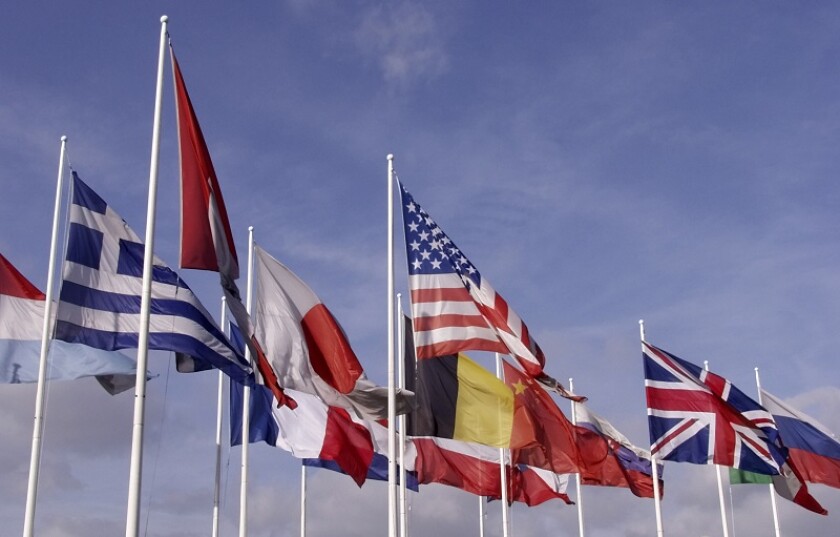Countries including the US, UK, EU, Australia and Japan have been placing a series of financial sanctions on Russia and Belarus over the past few weeks in response to the invasion of Ukraine.
As we approach a month since the invasion, the implications of these restrictions have made waves globally, from a great corporate reshuffle to renewed interest in Central Bank Digital Currencies (CBDCs). They have also raised fresh compliance challenges for firms, with sanctions regimes diverging between countries and having been applied at different paces.
“We are likely to be in this environment, with a very complicated, multi-pronged and multifaceted regime, for months – if not years,” said Marcus Thompson, partner at Kirkland & Ellis during a press briefing. “Firms should not beat themselves up at this stage if they make a decision that may not necessarily be the right one when they look back with hindsight.”
Each jurisdiction has taken a slightly different approach to the range of sanctions that have so far affected trade, individuals, and Russia’s economy at large. The most impactful measures, however, have been the freezing of Russia’s central bank reserves in Western countries, as well as the removal of seven Russian banks from the SWIFT international payments system, which nearly caused the country to default on its debt and made its currency plunge by a staggering 30% against the US dollar.
Are sanctions truly hurting Russia?
The sanctions have hit Russia’s economy quite harshly at this stage. The country has been faced with the prospect of defaulting on some of its sovereign bonds as it was feared the payments, designated in dollars, would not be completed.. While Russia has actually been able to repay and the US authorities have now processed the payments, this is likely to have been the first of many tipping points.
The long-term effects, however, are expected to be felt only once the sanctions have been in place for some time. If they are appropriately coordinated between Western countries, sources have said they could make a number of companies and banks go out of business, which as a ripple effect would further impact the country’s economic stability and could potentially lead to civil unrest.
“Russia managed to weather the storm of the 2014 economic sanctions very effectively and continued to be integrated into the international financial community with little lasting damage,” said Tom Keatinge, director of the Centre for Financial Crime and Security Studies at the Royal United Services Institute (RUSI).
It will be important to ensure that this does not happen this time around, Keatinge insisted. “The West will need to make sure that it is resolute and continues to press and refine sanctions for as long as it takes to get Russia to withdraw from Ukraine,” he said.
See also: Tougher sanctions on Russia needed
Can Russia use cryptoassets to evade sanctions?
A question that has gained much traction in recent weeks, is whether digital finance could be used as a tool to circumvent the sanctions.
“In theory, crypto can absolutely be used for that purpose,” said Matthew Nyman, counsel in law firm CMS’s banking and finance practice. “But in practice, it would be very difficult.”
The main issue that makes it difficult, Nyman explained, is volume – there isn’t enough liquidity in crypto to hold up Russia’s economy, he said. “Even if there was, there aren’t enough rouble-to-crypto exchanges to take on these transactions, as most exchanges use dollars,” he added.
See also: New crypto regulation won’t stop sanction evasion
Nevertheless, crypto could be used to raise extra capital to contribute to Russia’s economic war effort. “It is highly likely that we will see Russia try to engage in some activity via crypto,” said David Carlisle, head of policy and regulatory affairs at blockchain analysis provider Elliptic.
Other nations, including Iran and North Korea, have previously used digital assets to boost their economy when faced with international sanctions, having for instance engaged in crypto mining and cybercrime to raise capital.
In Russia’s case, however, using such means would only be of limited help. “Crypto cannot be used to evade sanctions on a large scale,” said Konstantinos Adamos, senior legal counsel at a London-based fintech. “Even nations that have systematically used crypto to evade sanctions have only managed to amass relatively small amounts. Given the size of the Russian economy, the impact would be negligible.”
How are sanctions affecting the rest of the world?
In the past few weeks, a vast number of Western companies have cut off operations in Russia, or have divested and restructured their businesses in order to adapt to the inflow of sanctions.
“As the weight and complexity of the sanctions increase, the obligation to check on that you are complying with the laws in each of the countries you operate in will become harder and harder,” said Kirkland & Ellis’ Thompson. “Any business that has historically had operations in Russia, has not done any sanctions screening, and continues not to, is asking for trouble with regulators and prosecutors.”
Sanctions will also have knock-on effects on Western businesses’ operations. “The airspace is now restricted, supply chains in and out of Russia will keep being restricted and getting paid for any goods or assets exported to Russia has become a lot more complicated,” added Thompson.
But divesting from the country is perhaps more difficult than it sounds for some companies. “The problem is knowing where the buyers are,” said Luca Enriques, professor of corporate law at Oxford University. “There is, and will continue to be, a rush for companies to say that they will sell, but how they execute on that promise will prove extremely tricky.”
Either way, this will likely continue to be a very challenging time for compliance teams, according to Elliptic’s Carlisle. “Things are moving extremely fast, and the nature and impact of the sanctions can be very complex,” he said.
See also: Restructuring and divestment expected as companies evade sanctions
In digital finance, the impact of sanctions has rapidly spread across the world as countries turn their attention to CBDCs. In China, for instance, policymakers have shown increased interest in the digital yuan, while in the US Joe Biden has pressed ahead with digital currency plans.
“In the context of geostrategic conflict, having a domestically controlled payment infrastructure to reduce related risks in the payments field is a plus,” said Ulrich Bindseil, directors of market infrastructure and payments at the European Central Bank (ECB), during a Peterson Institute for International Economics (PIIE) webinar. “This has been well-illustrated by what has happened over the last few days.”
Countries that have observed the impact of the SWIFT payments system removal on Russian banks could see increased value in a state-controlled system, according to Bindseil.
“The strict sanctions regime has highlighted the vulnerability of countries to restrictions targeting the dollar-focussed international financial system,” said Markus Ferber, member of the European Parliament. “Certain countries may want to hedge their bets in case they end up in a position where they have to avoid Western financial sanctions.”
See also: Sanctions spotlight security concerns for digital euro
Ukraine war sanctions on Russia

